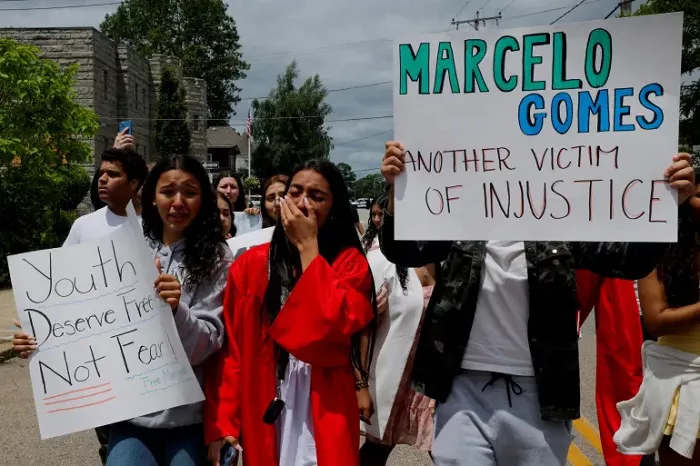Washington, DC — The haunting memories of shackles on her wrists, waist, and ankles remain vivid for 19-year-old Ximena Arias Cristobal, even weeks after her release from Immigration and Customs Enforcement (ICE) custody. The Georgia college student was detained following a routine traffic stop for turning right on red. Now, facing deportation proceedings, Arias Cristobal’s story has become a symbol of what rights advocates call a sweeping “dragnet” immigration enforcement policy targeting undocumented immigrants regardless of their criminal record or risk to public safety.
President Donald Trump, campaigning for re-election, pledged to expel “criminals” living in the U.S. illegally. But critics argue his administration’s aggressive deportation campaign is casting a far wider net, apprehending immigrants from diverse backgrounds—including vulnerable groups such as Dreamers—without regard to their threat level.
Vanessa Cardenas, executive director of immigration advocacy group America’s Voice, described the situation bluntly: “ICE is literally trying to go after anybody that they can catch.” She emphasized that Dreamers—young undocumented immigrants brought to the U.S. as children—are especially at risk. “In this dragnet, we’re seeing deeply rooted Dreamers and others who have lived in the U.S. for years being targeted.”
Arias Cristobal is one of an estimated 3.6 million Dreamers nationwide, many protected under the Deferred Action for Childhood Arrivals (DACA) program introduced by President Barack Obama in 2012. DACA provides temporary deportation relief for immigrants who arrived before June 15, 2007, and meet other requirements. However, legal challenges and administrative pauses on new applications mean many Dreamers remain unprotected.
Gaby Pacheco, leader of TheDream.US, an organization supporting Dreamers, highlighted the urgency of the situation: “Recently, multiple Dreamers have been arrested, detained, and even deported.” She added that 90% of the young immigrants her group supports do not qualify for protections like DACA.
The Trump administration’s recent moves have only intensified fears of an expanding crackdown. Last week, Homeland Security Secretary Kristi Noem and White House Deputy Chief of Staff Stephen Miller raised ICE’s daily arrest quota from 1,000 to 3,000. Meanwhile, a draft budget—dubbed the “One Big Beautiful Bill”—would allocate roughly $150 billion toward deportations and immigration enforcement, pending Senate approval.
Yet, data suggest that the portrayal of undocumented immigrants as rampant criminals is misleading. Studies consistently show that undocumented immigrants commit fewer crimes than U.S.-born citizens. Furthermore, according to the Transactional Records Access Clearinghouse (TRAC), immigration arrests and deportations under Trump’s current term have only marginally increased compared to the final months of President Joe Biden’s administration.
From January 26 to May 3, the Trump administration averaged 778 immigration arrests daily—just 2% higher than Biden’s rate of 759 arrests per day. Deportations were actually slightly lower under Trump during that period.
Nevertheless, advocates warn that the pressure to meet heightened quotas will drive immigration enforcement to adopt more aggressive and sweeping tactics. The administration has reversed policies that restricted immigration enforcement in sensitive locations such as schools and churches, used wartime laws to expedite deportations without due process, and revoked protections for certain foreign nationals.
The administration is also encouraging local law enforcement cooperation with ICE through the delegation of immigration powers under Section 287(g) of the Immigration and Nationality Act. For example, a coordinated sweep by Tennessee Highway Patrol and ICE in early May led to nearly 100 arrests during traffic stops. Another large-scale operation in Massachusetts in June resulted in 1,500 arrests, including that of 18-year-old high school student Marcelo Gomes Da Silva, whose detention sparked protests in his hometown of Milford.
Public backlash to these actions is growing, with protests and vocal support for detainees like Arias Cristobal signaling widespread opposition. “We’re seeing more and more pushback from Americans,” said Vanessa Cardenas. Yet, she warned that the administration remains determined to pursue its enforcement agenda. “If Congress approves more funding, they’re going to go after our communities even harder.”
As the deportation quotas rise, advocates fear that the nation faces a deepening immigration dragnet, sweeping up thousands more immigrants in an increasingly punitive system.
Related topics:
- GOP Budget Plan Cuts Immigrant Aid, Raises Application Fees
- Dr. Oz Cracks Down on States Over Medicaid for Undocumented
- Germany Moves to Tighten Immigration and Asylum Rules


